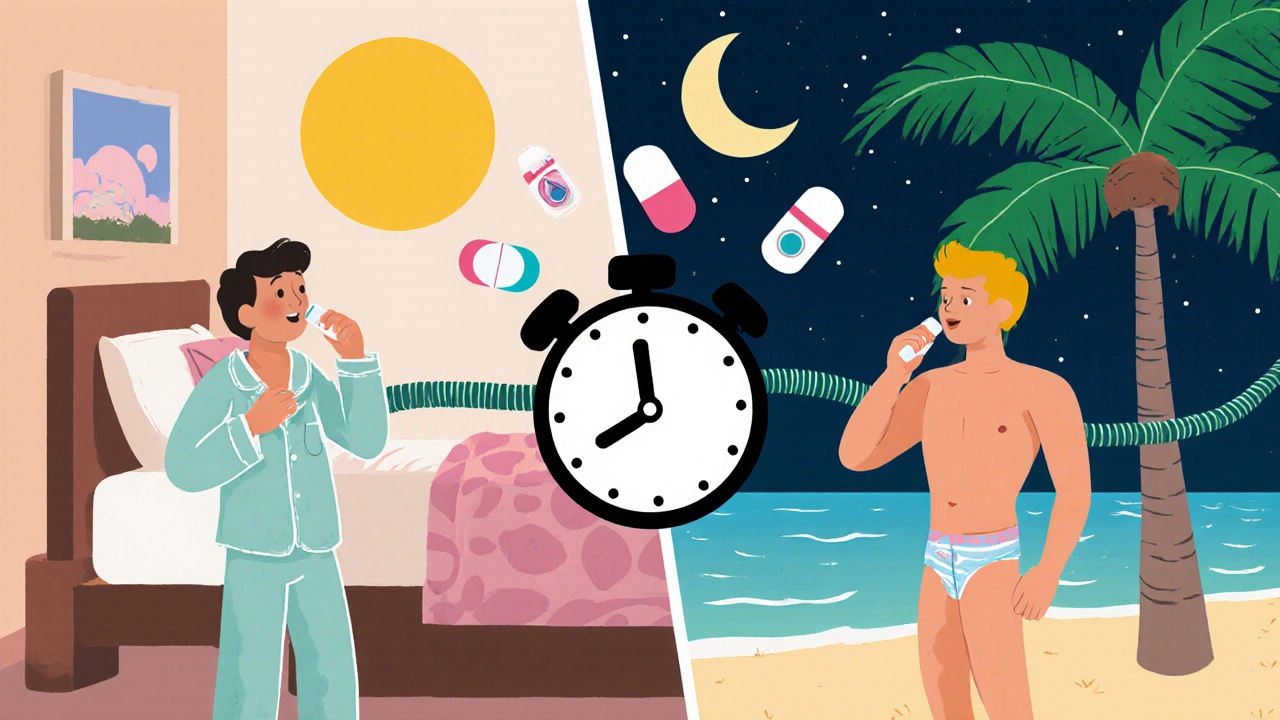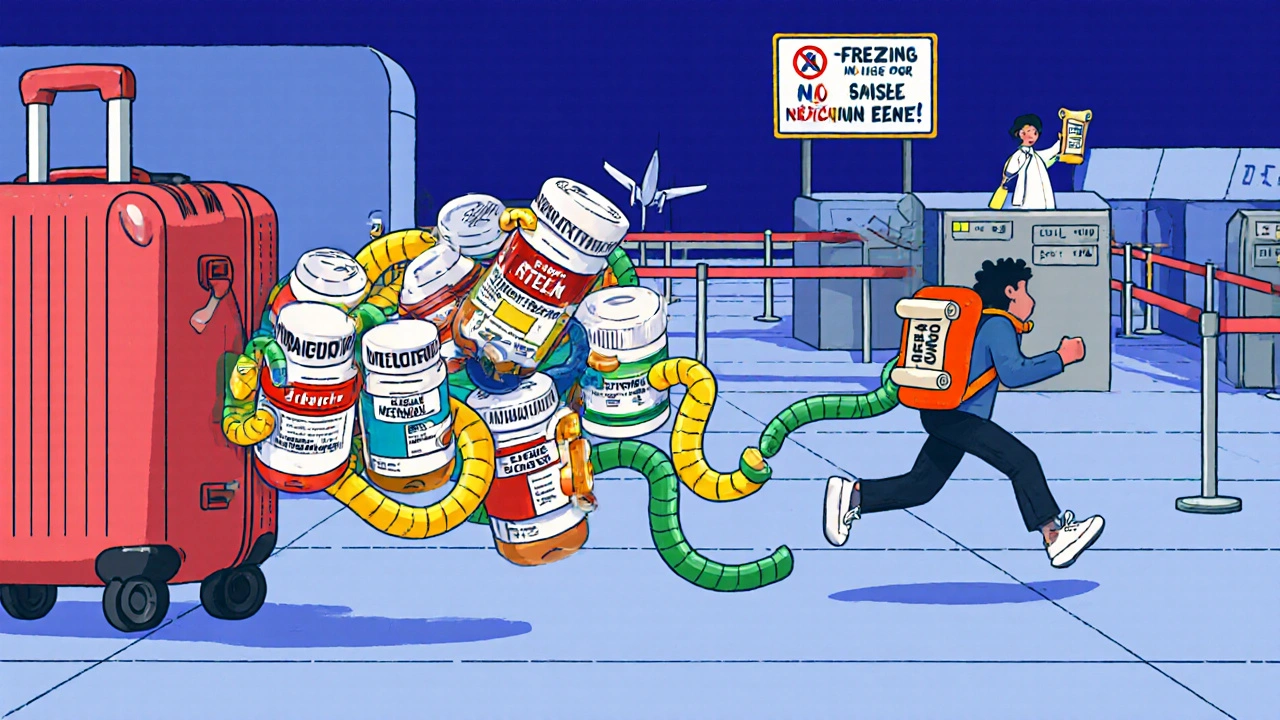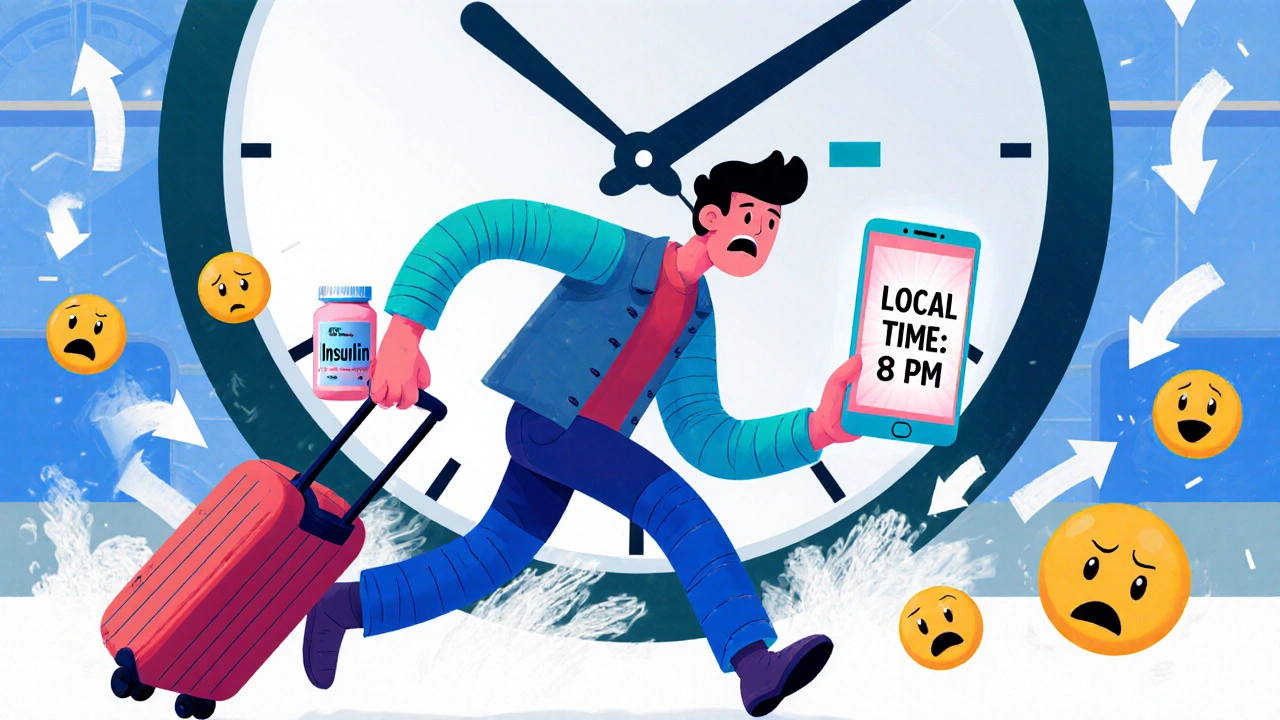Why Medication Adherence Gets Messy When You Travel
You’ve planned your trip: flights booked, hotel reserved, sightseeing list ready. But what about your pills? If you take medication daily - whether it’s for blood pressure, diabetes, epilepsy, or birth control - crossing time zones can turn your routine into a minefield. Medication adherence isn’t just about remembering to take your pills. It’s about timing them right. Take a dose too early or too late, and the effect can drop, spike, or vanish entirely.
According to the National Center for Health Statistics, over half of U.S. adults take at least one prescription drug. And when they travel, nearly 40% miss at least one dose. That’s not just inconvenient - it’s dangerous. Missing a dose of insulin? Risk of diabetic ketoacidosis. Skipping an antiseizure med? Seizure risk jumps nearly fourfold. Delaying birth control pills? Unplanned pregnancy becomes a real possibility.
The good news? You don’t have to wing it. With the right plan, you can travel anywhere and still stay on track.
Know Your Meds: What Needs Precision, What Doesn’t
Not all medications are created equal when it comes to timing. Some can be flexible. Others can’t.
High-risk meds need exact timing:
- Insulin: Even a 30-minute delay can cause blood sugar swings. Basal insulin doses need adjustment after crossing more than three time zones.
- Anti-seizure drugs: Johns Hopkins research shows missing a dose by more than two hours increases seizure risk by 3.7 times.
- Oral contraceptives: If you’re more than 12 hours late, you lose protection. Backup contraception is required.
- Anticoagulants (like warfarin): Diet changes and schedule shifts can throw off your INR levels. Test within 72 hours of returning home.
- HIV antiretrovirals: These require near-perfect adherence. Missing doses can lead to drug resistance.
Lower-risk meds (like many blood pressure or cholesterol pills) can usually be taken within a 4-hour window - two hours before or after your usual time - without losing effectiveness, according to UCSF’s 2023 research.
Still, never assume. Always check with your pharmacist or doctor before your trip.
Plan Ahead: The 4-Week Rule
Waiting until the night before your flight to think about your meds? That’s how emergencies start.
The American Pharmacists Association recommends scheduling a medication review 4 to 6 weeks before departure. Here’s what to cover:
- Confirm your dosage and schedule for each medication.
- Ask: Should I adjust timing before, during, or after the trip?
- Get a written list: brand name, generic name, dose, frequency, reason for use, and your doctor’s contact info.
- Request a letter for controlled substances if you’re traveling to countries like Japan, South Korea, or the UAE - where even common painkillers can be restricted.
- Ask about refills. Can you get an extra 7-14 days’ supply? International pharmacies aren’t always reliable.
Don’t forget to check your destination’s rules. The World Health Organization says 27% of medication-related travel disruptions happen because travelers didn’t know local laws. For example, codeine is banned in Japan. Melatonin is regulated in the UK. Know before you go.

How to Adjust Your Schedule Across Time Zones
Here’s the practical part: what to do when the clock changes.
Time zone change under 3 hours: Stick to your home schedule. No need to adjust. Your body won’t notice the shift.
Time zone change over 3 hours: Two strategies work best.
Option 1: Jump straight to destination time - Use this for most medications (except insulin and seizure drugs). Take your first dose at the local time when you land. Then stick to that new schedule. For example, if you normally take a pill at 8 a.m. EST and land in London at 8 p.m. local time (3 p.m. EST), take your next dose at 8 p.m. London time. This helps your body adapt faster.
Option 2: Gradual shift - Ideal for longer trips or sensitive meds. Start shifting your schedule 1-2 days before you fly. If you’re flying east (losing time), take your pill 1 hour earlier each day. If flying west (gaining time), take it 1 hour later. This reduces jet lag and keeps your body in sync.
For insulin users crossing 5+ time zones: Reduce basal insulin by 20% per time zone beyond three. Always coordinate this with your endocrinologist. Meal-time insulin should match local meal times - not your home time.
Pack Smart: Avoid the 63% Mistake
Over 60% of medication emergencies during travel happen because pills were packed in checked luggage. Delayed bags. Lost luggage. Stolen bags. You don’t want to be that person.
Here’s how to pack right:
- Keep all meds in your carry-on. Always.
- Use original bottles with labels. TSA allows more than 3.4 ounces if it’s a reasonable quantity for your trip - but you must declare it at security.
- Bring a printed copy of your medication list. Keep it separate from your pills - in your wallet or passport holder.
- For refrigerated meds (insulin, some biologics): Use an insulated pouch with ice packs. Insulin exposed to temperatures above 86°F for over 24 hours can lose up to 27% potency.
- Don’t rely on airport pharmacies. They may not carry your brand, or may require a local prescription.
Pro tip: Put a small note in your bag: “Prescription medication. Do not freeze.” It helps airport staff understand your needs.
Use Tech - But Not Just Any App
Alarms on your phone? They’re better than nothing. But they’re not enough.
Studies from NimbleRx show travelers who used apps with automatic time zone adjustment had 47% fewer missed doses. Standard alarms? They still ring at your home time - even when you’re in Tokyo.
Look for apps that:
- Auto-detect your location and switch schedules
- Send reminders in local time
- Allow you to log missed doses and sync with your doctor
Popular options include Medisafe, MyTherapy, and Dosecast. Test one before your trip. Set two alarms - one for the reminder, one as a backup 15 minutes later.
Still, tech fails. Always have a backup plan: a written schedule, a pill organizer with labeled compartments, or even a trusted travel buddy who knows your routine.

What If You Miss a Dose?
You’re on a train. You’re sleeping. You forgot. Now what?
Never double up. Mayo Clinic data shows doubling doses increases adverse reactions by 4.2 times.
Here’s what to do instead:
- For most meds: If you realize you missed a dose within 2 hours of your scheduled time, take it. If it’s more than 2 hours past, skip it. Don’t double. Wait for your next scheduled dose.
- For antibiotics: Never double. Inconsistent dosing increases antibiotic resistance by 18%, according to CDC data. Just resume your schedule.
- For HIV meds: Take the missed dose immediately - even if it’s close to the next one. Maintaining blood levels is critical.
- For birth control: If you’re more than 12 hours late, take it as soon as you remember, but use condoms for the next 7 days.
- For insulin: If you miss a basal dose, contact your doctor. Don’t guess. If you miss a meal-time dose, check your blood sugar and follow your correction protocol.
When in doubt? Call your pharmacy. Many offer 24/7 travel support lines.
Final Checklist Before You Fly
Here’s your last-minute checklist - print it, save it, stick it to your suitcase.
- ✅ All meds in carry-on, labeled, in original bottles
- ✅ Printed medication list (brand + generic names, doses, doctor info)
- ✅ Physician letter for controlled substances (if traveling to Japan, UAE, etc.)
- ✅ 7-14 extra days’ supply beyond your trip end date
- ✅ Insulated cooler for refrigerated meds
- ✅ Medication app set up with auto-time zone adjustment
- ✅ Emergency contact numbers saved on phone and written down
- ✅ Destination medication laws researched (WHO or embassy website)
Travel doesn’t have to mean skipping your meds. With planning, the right tools, and a little caution, you can fly across the globe - and still take your pills on time.
Can I bring my medications in my carry-on even if they’re over 3.4 ounces?
Yes. The Transportation Security Administration allows medications in quantities larger than 3.4 ounces in carry-on bags as long as they’re for personal use during your trip. You must declare them to TSA agents at the security checkpoint. Keep them in their original containers with labels intact. No need to put them in a clear plastic bag like liquids - but be ready to explain what they are.
What if I’m flying to a country that bans my medication?
Some countries ban or strictly regulate common medications. For example, codeine is illegal in Japan, and pseudoephedrine is restricted in the UAE. Always check the destination country’s embassy website or the World Health Organization’s travel advisories before you go. If your medication is restricted, talk to your doctor about alternatives. Never try to sneak it in - you risk fines, detention, or deportation.
Should I adjust my insulin schedule before I leave or after I arrive?
For insulin, it depends on your regimen and how many time zones you’re crossing. If you’re crossing more than three zones, your doctor may recommend adjusting your basal insulin dose by 20% per additional zone. Most experts suggest waiting until you land to switch to the local time schedule - but you’ll need a pre-travel plan. Never adjust insulin without medical guidance.
Is it safe to take my pill an hour early or late?
For most medications, yes - within a 4-hour window (2 hours before or after your usual time). But for time-sensitive drugs like seizure meds, birth control, or HIV meds, even a 1-2 hour shift can matter. Always check with your pharmacist or doctor. When in doubt, stick closer to your usual time.
Do I need a doctor’s note for my meds when traveling internationally?
You should get one if you’re carrying controlled substances - opioids, stimulants, benzodiazepines, or certain antidepressants. Countries like Japan, South Korea, and the UAE require documentation. Even if not required, a note from your doctor explaining your condition and medication need can prevent delays or questions at customs. Keep it printed and in your wallet.
What should I do if my meds get lost or stolen?
If your meds are lost or stolen, contact your embassy immediately. They can help you locate local pharmacies or medical services. If you have your medication list and doctor’s contact info, you may be able to get a replacement. Pharmacies in major cities often carry U.S.-brand drugs, but generic equivalents may differ. Never go without critical meds like insulin or seizure drugs - seek emergency care if needed.
What to Do Next
Start now. Not tomorrow. Not the day before you leave.
Call your pharmacy. Ask for a medication review. Print your list. Download an app. Pack your pills. Research your destination’s rules. Get that doctor’s note.
The goal isn’t perfection. It’s consistency. You’ve managed your health every day. Now, take that same care with your travel plans. Your body will thank you - whether you’re in Tokyo, Paris, or Buenos Aires.
 Nov, 19 2025
Nov, 19 2025

Nosipho Mbambo
November 19, 2025 AT 22:42Katie Magnus
November 20, 2025 AT 22:13King Over
November 22, 2025 AT 20:28Johannah Lavin
November 24, 2025 AT 11:34Ravinder Singh
November 24, 2025 AT 13:32Russ Bergeman
November 25, 2025 AT 23:41Dana Oralkhan
November 26, 2025 AT 15:11Jeremy Samuel
November 27, 2025 AT 01:03Destiny Annamaria
November 27, 2025 AT 18:03